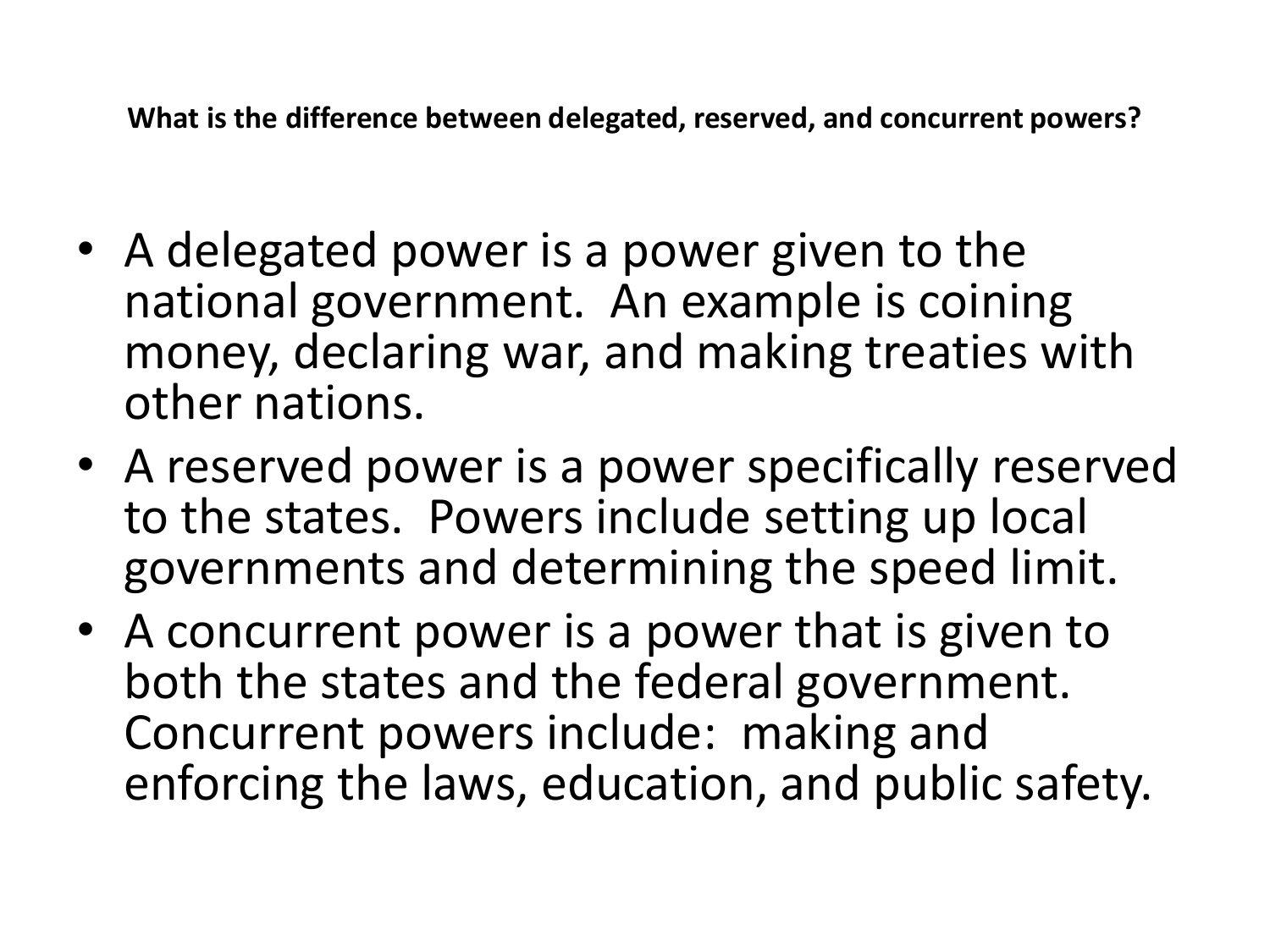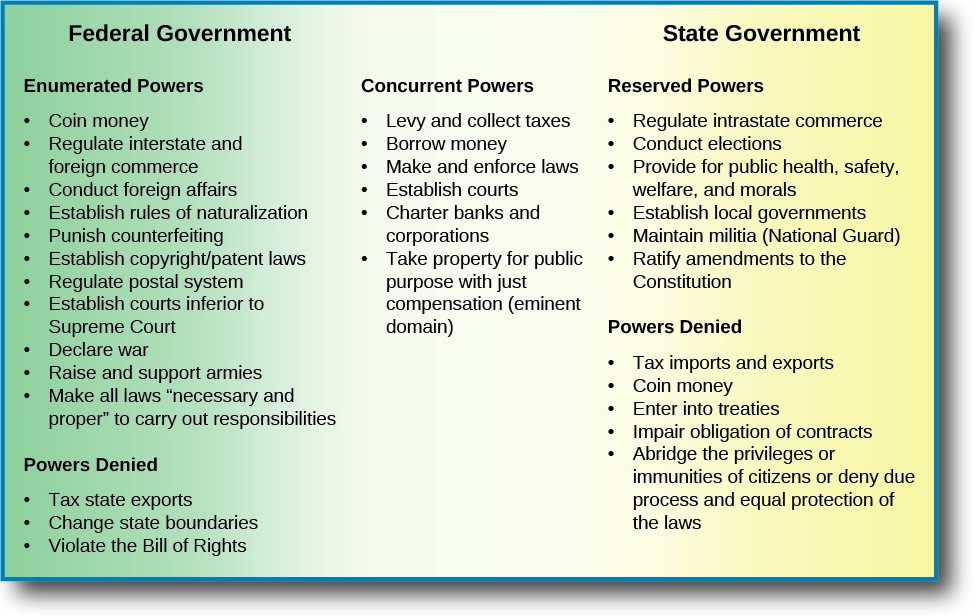Is Making and Enforcing Laws a Reserved Power
The President Approves or Vetoes the Bill. See also enabling clauses.

What Is The Difference Between Delegated Reserved And Concurrent Powers Lisbdnet Com
These powers may vary depending on the nation.

. In general the power of a government entity to enforce the law through investigations arrests and the ability to sue suspects on behalf of the public. The proposal for a new law is called a bill and once it is introduced members of the House of Representatives or of the Senate will meet to discuss it or make changes to it. May not violate the Bill of Rights.
Notably both the states and the federal government have the power to tax make and enforce laws charter banks and borrow money. A reserved power is a power specifically reserved to the states. Article II Section 2 Clause 2.
Up to 24 cash back Reserved Powers. Charter banks and corporations. The answer is no.
Executive legislative and judicial. Shared power is making and enforcing laws. An example is coining money declaring war and making treaties with other nations.
Concurrent powers are powers that are shared between the federal government and the states. Building roads can be a delegated power but it need not be. Those powers not delegated to the Federal Government or denied the states are reserved for the states.
Other concurrent powers include the power to make roads create lower courts borrow money create and enforce laws and charter banks and corporations. In constitutional law the name for a provision that expressly authorizes Congress to enforce a constitutional amendment through appropriate legislation. Powers include setting up local governments and determining the speed limit.
If both houses of Congress approve a bill it goes to the President who has the option to either approve it or veto it. A concurrent power is a power that is given to both the states and the federal government. He shall have Power by and with the Advice and Consent of the Senate to make Treaties provided two thirds of the Senators present concur.
Reserved Powers Rather than attempting to list every power or authority the states might have the Constitution deals with the issue by giving states broad discretion with all powers that are not specifically granted to the federal government remaining with the states. Is building roads a delegated power. A reserved power is a power specifically reserved to the states.
No building roads would be an example of a concurrent power. Other concurrent powers used by the states are the establishment of state and. AnswerIt is a central seat of power for the confederation of all states with the authority to override what is believed to be a states in error with the power to.
The power of the federal government to make and maintain interstate highways is aan. The 10th Amendment of the US Constitution states that any powers that are not delegated to the federal government are reserved for the states. That means the separation of powers into three branches each with a distinct function that cannot constitutionally be performed by either of the other two.
When Congress gives powers to an agency the legislation is known as an enabling act. Reserved Vth Amendment Take measures for public health and safety. In cases where laws created by the states conflict with federal law the states must conform to the federal law.
State powers are also limited in the sense that states cannot make laws that conflict with the laws of the federal government. Which branch has the sole power of impeachment. If approved the new law is called an act or statute.
The power of the executive branch is enforce the lawsthe power of the legislative branch is to make laws and the power of the judicial branch is. Making and enforcing the laws education and public safety. Powers include setting up local governments and determining the speed limit.
A concurrent power is a power that is given to both the states and the federal government. A reserved power is. Countries in which concurrent powers are shared.
Some of the better-known laws related to the environment are the Clean Air Act the Clean Water Act and the Safe. Establish a postal system. Charter banks and corporations.
Only the federal government can coin money regulate the mail declare war or conduct foreign affairs. Spend money for the general welfare. Concurrent powers are powers shared by the federal government and the states.
A system of government in which the people are regulated by both federal and state governments. Usually the agency will have all three kinds of power. Making and enforcing laws 2 See answers Advertisement ogorwyne An example of a reserved power in this question is making treaties and conducting foreign policy.
Ratify amendments to the Constitution. In some jurisdictions road-building is a delegated power from the more central. Make and enforce laws.
Make enforce and interpret laws. Regulate interstate and international trade. Examples of reserved powers include conducting elections establishing schools establishing local government regulating local business and regulating marriages.
The concept that Congress can delegate power to an agency is known as the delegation doctrine. Powers that are shared by both the Federal and. Option A is the correct answer to the question.
And he shall nominate and by and with the Advice and Consent of the Senate shall appoint Ambassadors other public Ministers and. Use any power the Constitution doesnt give the federal government or deny to the states. ArtIIS2C21 The Treaty Making Power.
Another example of a concurrent power is the power to tax. The Guarantee Clause of the Constitution mandates a republican lowercase r form of government in the states. Most states also have a state police force that helps to enforce those laws and to keep the states safe.
Such reserved powers include the management of state governments the power to run elections. Similar to the national government state governments have legislatures that propose and pass new laws. Maintain an armed forces.
Make laws that are necessary and proper to carry out its powe. State governments have the power to regulate within their state boundaries. That is the agency can set the rules that business must comply with.

The Division Of Powers American Government

What Is The Difference Between Delegated Reserved And Concurrent

No comments for "Is Making and Enforcing Laws a Reserved Power"
Post a Comment